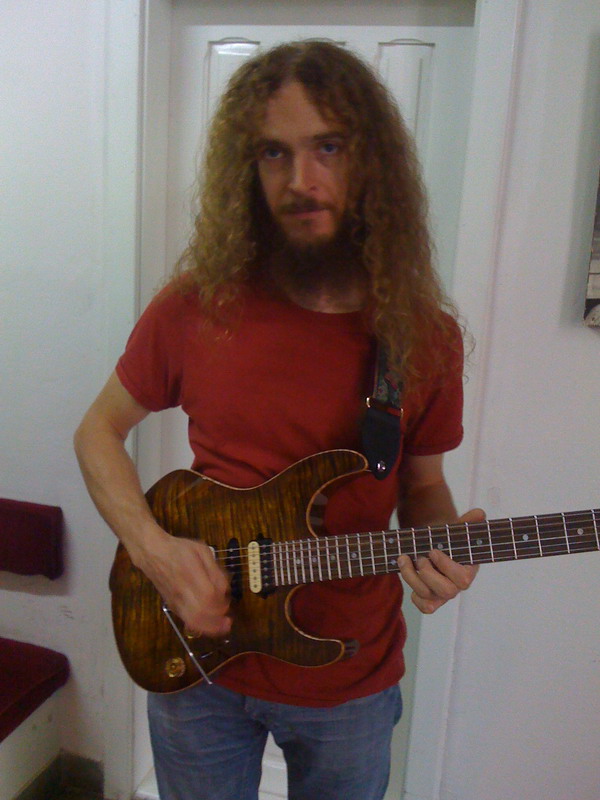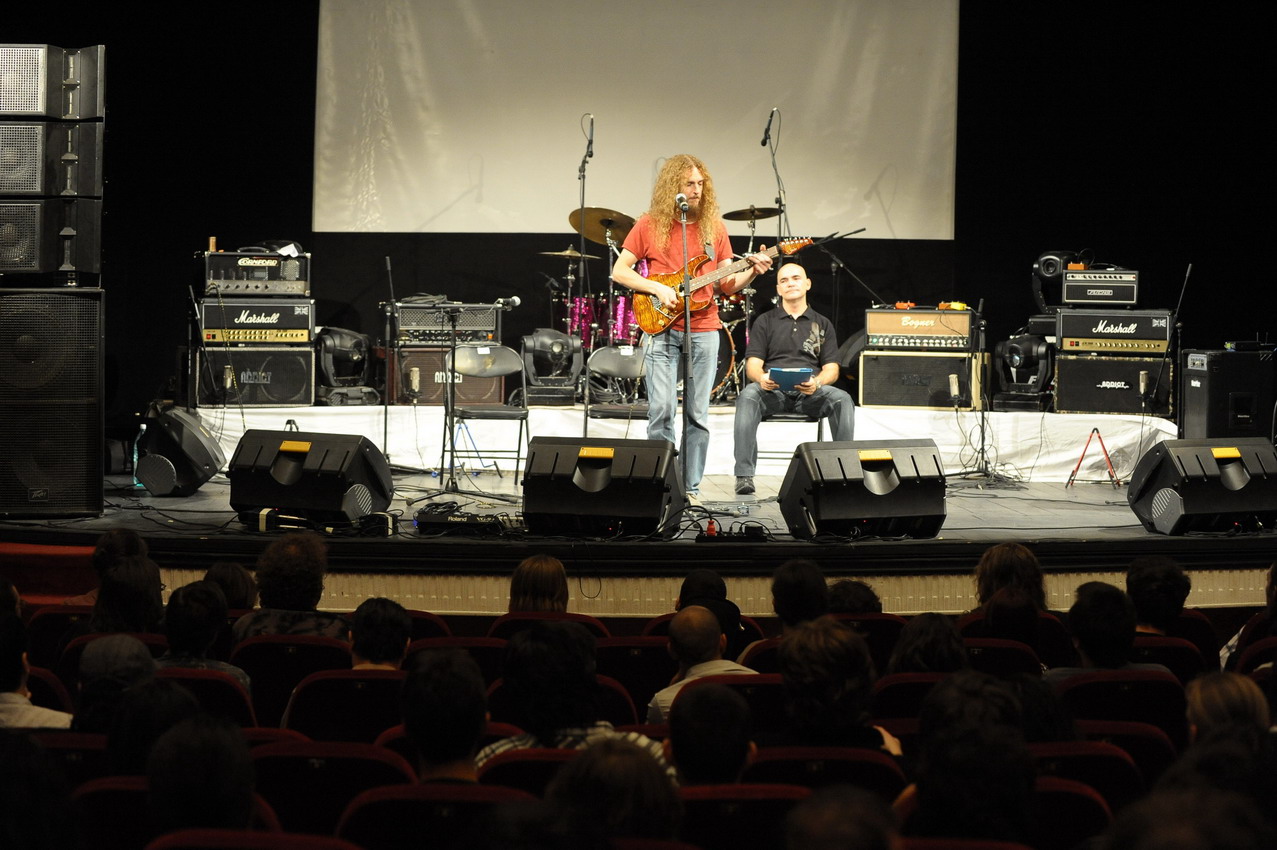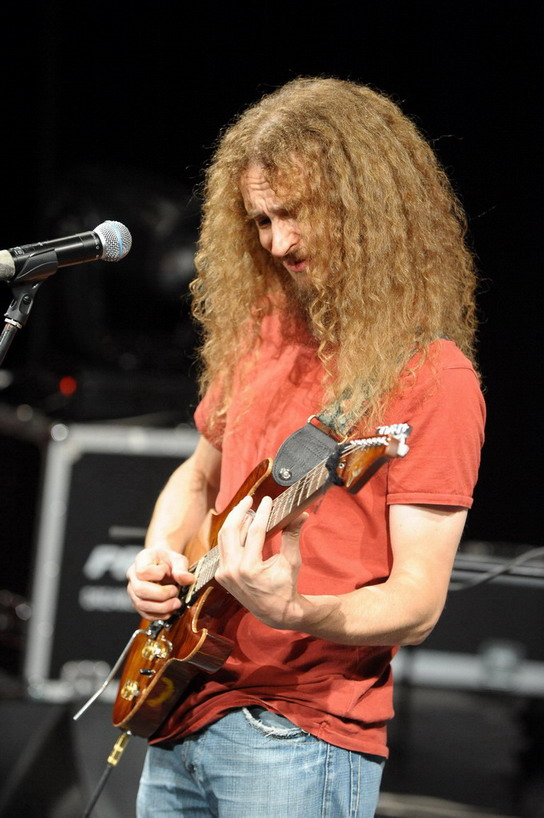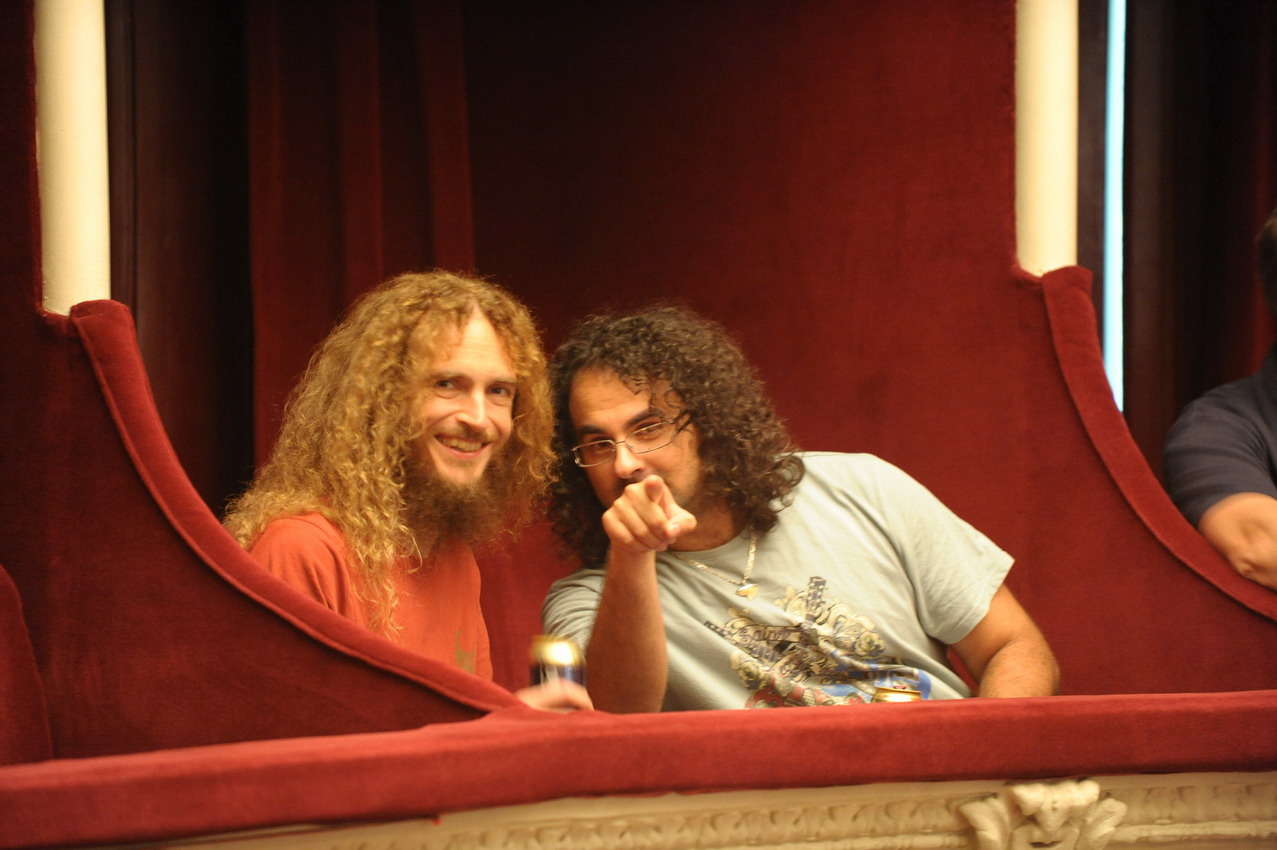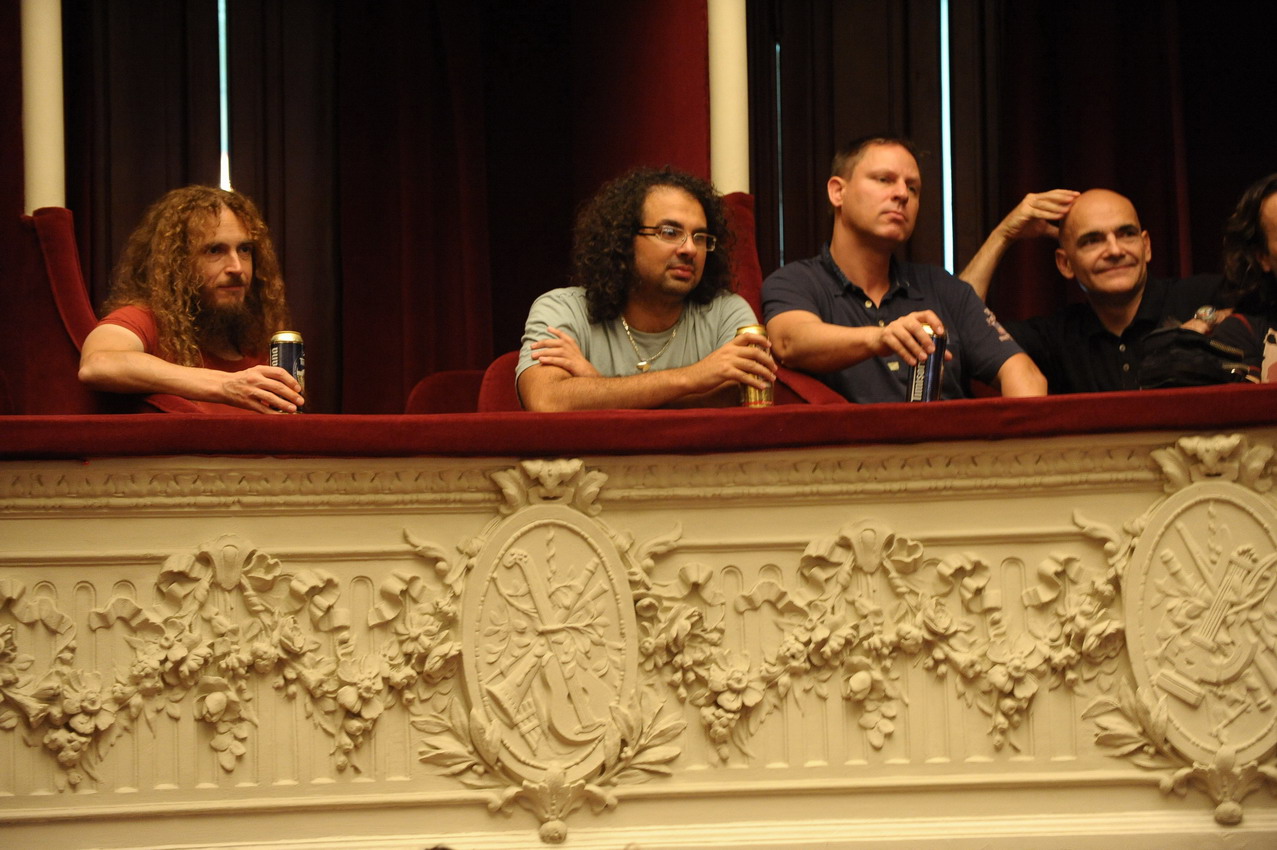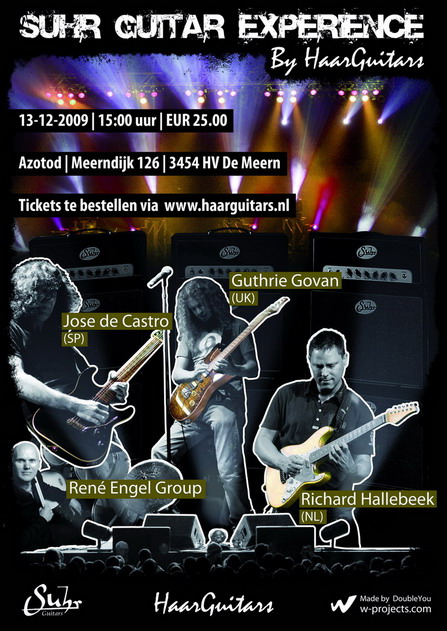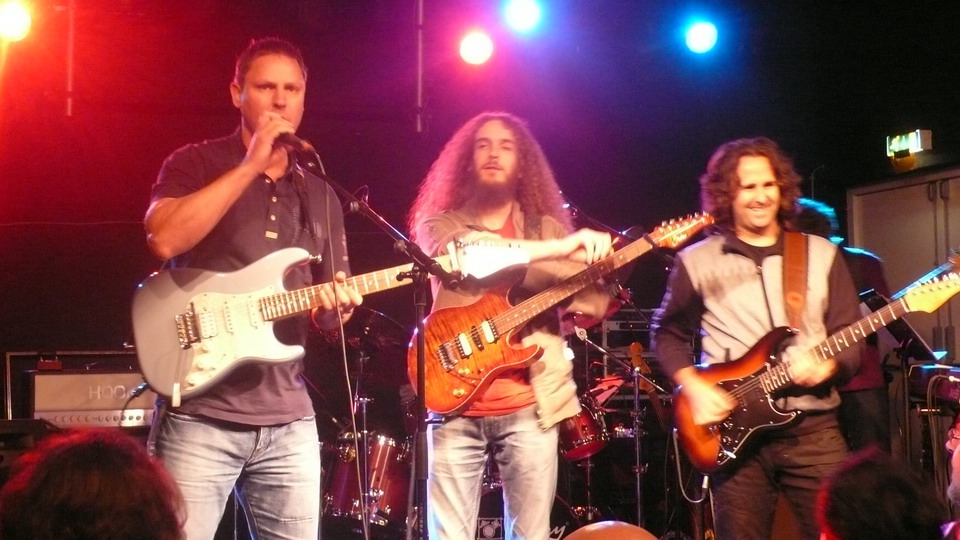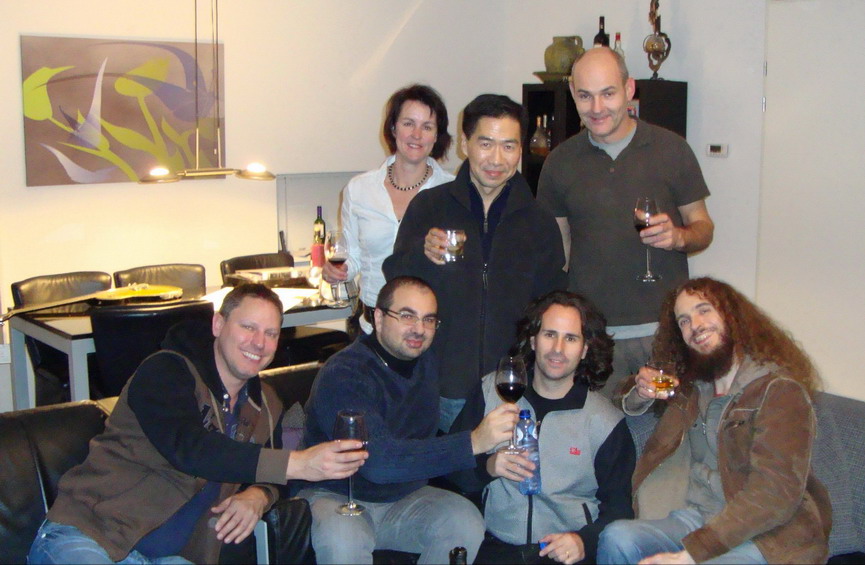I had played with Guthrie at the ‘Ziua Chitarelor’ guitar festival in Bucharest in september of 2009 together with Mattias Eklundh and Jose de Castro. I thought it would be kind of cool to take that whole circus to Holland and so I organized a ‘Suhr event’ for Jose, Guthrie and me with the help and organisation skills of Jos van Capelleveen en Erik v/d Haar. We were all backed up onstage up by my buddies from the Rene Engel Band and Haarguitars made sure there were enough HOOK amps for all. A year later, we did we a couple of mini-tours in Holland and Germany with this same group of players. On november 23, 2010 we played the 013 hall in Tilburg. The place was packed! Just before doing soundcheck I sat down with Guthrie and we had this little conversation. A shorter version of this interview has been printed in the december 2010 Music Maker issue.
This interview and pictures are copyright Music Maker and Richard Hallebeek. Copying or use elsewhere without written permission strictly prohibited.
:: When did you start playing?
Oh, we’re doing this?
:: Yeah, let’s do the first part, since we seem to have some time before the gig.
Cool! Ok… I appearently started playing when I was 3, long time ago. I actually remember the guitar was a very big thing.. back in those days. And..
:: Where did you grow up?
What place? Chelmsford.
:: Big family?
Not at the time. I was the first born. My dad played guitar a little bit. He was more enthusiastic then he was accomplished. But both of my parents were keen on music. I grew up appreciating that music was something you would sit down and listen to, rather then some sonic wallpaper that you have as the background to your live, so..
:: Did you have your dad as a teacher at that time?
He showed me his five chords and the rock ‘n roll trick with the power chord, plus the little finger and every few months I could go down an extra fret. So, yeah to me I assumed everyone was learning an instrument. It freaked me out when I went to school and I discovered no one else could really play anything.
:: What kind of stuff were you into at the time?
Rock ‘n roll. I think the first 300 songs I learned were Chuck Berry, Elvis, Little Richard, that kinda thing. Which is great, you end with a repertoire, you can do a whole gig, but harmonically it’s all basically the same thing. It was good for me ’cause I could actually get out, and I got to jam my dad’s friends and I’d do gigs like that. Apparently I did my first gig when I was five. I really think that’s an important part of it, if you want to have a relationship with your instrument, it’s great to be able to go out and play with people and play to people. Don’t get to much cabin fever. But I can’t take any credit for it. It’s just the way things ended up.
:: Yeah.. you seem very comfortable in front of an audience, no nervousness.
I think it’s good to have something like nervousness. It’s just a by-product of caring. If you can channel it… I think the nerves can either destroy someone, or if you channel it, harness the nervous energy, you can turn it into something constructive. And hopefully put more into the performance. That’s the theory.
:: What was the thing you studied in the past, with literature?
That was the other thing that I nearly ended up doing with my life. I always found it easy to do the English literature. So I ended up at Oxford University. Reading is great. It’s another language. A lot of these art forms have different aspects of each other and there is this theme that unites them all. So in English, something like Shakespeare or the King James Bible, there is something very musical about it. It just sounds good, quite apart from the meaning. Weirdly I found, I was getting lessons at that stuff when I went to university, and it wasn’t enough to be interested or just to enjoy it, the university thing was; now you have to break it down and dismantle it and tell us why it works. Which is a bit like dissecting Salma Hayek to find out why she has a pulse, you know.(laughs)
:: Yeah, I can see why you weren’t into that!
I was always happy just to enjoy things on a sub conscious level. Nice and organic and not think to hard about it.
:: When did you start writing for the music magazine?
That was.. I did a year at Oxford and then left and did some hardcore fast food work for a while, try to pay off debts. I got tired of that and then decided I had to invent a job for myself. As we both know, there isn’t really an established system for applying for a job in the world of music, you have to invent things sometimes.
:: You have to jump at every opportunity.
Yeah. So I figured being a self-taught kinda guy, I’d always transcribed stuff and slowed records down.
:: So how did you learn to write notes properly?
Go to the library. But the thing where you can hear something and write it down without waiting for the middleman.. without waiting for some tablature to appear on a plate, that was a big part of the way I learned. And so I figured.. maybe I can get a job transcribing. Since there’s lots of people struggle to work out stuff that I think is easy, so…
:: You’ve invented a job!
That’s the job I invented, yeah. I transcribed some Shawn Lane stuff. The scariest thing I could think of at the time. Sent it to Guitar Techniques magazine..
:: At the time there weren’t the amazing slowdown programs that there are now. How did you transcribe the fast stuff?
I kind of had a cheap cheat of sorts. I had a Yamaha SPX 900 and there’s a sampler in there, which I think was 1.5 seconds. So I could slow down maybe half of a lick.(laughs)
:: Ah, ok.
But it was bizarre, it was very easy to loose track, with where the pulse was. Like, where is beat 1 in this..?
:: How long did you work for Guitar Techniques?
I did that for nearly two decades. We were all proud of being involved in that magazine at the time.
:: At the time I remembered it was one of the first magazines that came out with a cd included, also with proper transcriptions.
You alienate all the doctors and lawyers. There’s no 8-page review of a Paul Reed Smith guitar with lavish color photos. There’s no guitar porn. Not too much of the interviewing.. famous guitar players. Just wall to wall.. learning.
:: I liked the mag. Then you started playing in Asia. How did that come about?
Through a guitar school, a music school. The head of drums there was guy called Michael Sturgis. He used to tour with Asia a lot, then became more of a family man, so he bowed out of his touring commitments, but they’d still call him to be the session drummer on the next album. So they were.. this would have been about 1999.. I think. The Asia guys were in the studio, desperately behind schedule and in dying need of finishing the album, really suddenly.
:: And in desperate need of a guitar player?
No, I think they put aside a lot of their budget for Steve Lukather’s guest solo or Brian May’s guest solo and.. for various reasons the people they wanted on the album couldn’t make it. So presumably they were patient for as long as they could be and then at the very last moment had to be grimly resigned to the fact; these guys aren’t gonna play on the album, so they asked the drummer do you know anyone that could just come in and play guitar parts and not take too long and not cost too much, I guess. So he recommended me, purely as an anonymous session guy. So I went in there. Had a wonderful time. The first track I played on had Vinnie Colaiuta on drums and Tony Levin on bass, so I never met the guys. They were just one’s and zero’s on a hard disk. But it felt really exciting.
:: That must have been an exciting time. Did you get a chance to learn the songs beforehand?
No. I’d just turn up in the studio and they’d press play.. and go, you got that? And I was, no.. I was listening to the hihats doing that amazing thing. Play it again and I’ll try not to concentrate on Vinnie this time..(laughs) But yeah, we’d pieced it all together, on sight.
::You were touring with the guys for quite some time.
Yeah, I just realized one day, Oh.. I’m in Germany, we’re soundchecking.. I guess I’m kind of in Asia then!
:: So it was never really formal?
..no. At the beginning, no. I was the session guy and then I was the guy they needed to play some guitar parts, because they had a tour and they didn’t have a guitar player. So it was after a while, I was kind of in the band, I guess.
:: What guitar were you playing at the time?
That was my old trusty PRS. There’s a lot of those guitar that don’t really do it for me. I guess has a very specific sound that he has in his head and it’s very mid-centered, heavy brick like, you know. But the stereotypical PRS sound. The one I found is a little bit strattier then most. But it’s certainly well. I played that guitar pretty much exclusively until I met the Suhr guys a few years back.
:: How did you get in touch with Suhr?
It was during a Cornfornd amps clinic. Around the NAMM period. And I went to Tone Merchants which subsequently became the stuff of legend. At the time, there was no one doing it. A gig there.. it was just a really high end boutique guitar store where you had to make an appointment to go in and try stuff. I had never seen so many expensive things in one place. It’s great just to be able to try all those amps you’ve been hearing about, not in a NAMM show capacity where there’s.. the police when there’s too much noise. You can crank it up to gig levels. We were invited to go there and just demo Cornford amps for people that might be interested in the obscure new British boutique amp. Of course, the guy running the shop there was Ed Yoon. Within a year or so he wasn’t running the shop anymore, he was doing the artist relation stuff at Suhr guitars. So we kept in touch. I don’t need to tell you how helpful Ed can be.
:: Ed is great and a great contact at Suhr at the time he was working there. Ed contacted me when we were playing together in Bucharest about us playing Surh and then Ed basically took if from there and took care of my endorsement. What is your mahogany Suhr guitar, the one that you have been playing for the past years, is that one you just picked from the Suhr collection or was is especially built for you?
The one I have is kind of a signature model. What happened was.. the guys at Suhr would lend me a guitar or send me a guitar and say; we’d thought you might like to try this, a different wood combination or different pickups, and ask; how do you think it compares to the last guitar? It’s been great that they care what a player thinks. Over the course of a few years I developed a much clearer idea of what it was I was looking for in a guitar.
:: So what is it that you are looking for in a guitar?
Eehm..professionaly.. it’s nice to have one guitar that you think can do a credible impersonation of any guitar sound you might need. A mighty idea that you can have a jazz gig or a metal gig or a hillbilly gig, whatever, and the same guitar could kind of get away with it.
:: I also think it’s good for you personality and style so you kind of more or less have a stable factor and sound that more or less stays consistent while you play different genres. There’s people playing jazz gigs with a big jazz guitar and rock gigs with a floyd rose guitar and pop gigs with a strat and they sound like three completely different players, because the different guitars also make you play different.
Yeah. I think so. I’ve discovered that mahogany is the thing I relate to. From hearing old Clapton, back in the Cream days, when he was angry and had humbuckers(laughs) and that kind of screaming Gibson-esque sound, is what .. the guitar in my mind sounds like. So I figured out there’s a certain midrange honk that mahogany has and I thought, let’s start with that. Let’s make the core of the guitar this gnarly, SG-style screaming thing. And then try and work out what we can do with wiring, so that it does the.. what the brand ‘F’ shall we say shimmering clean stuff. And I think it’s a good compromise. The opposite of the typical super-strat thing, where you’ll start with a strat and then you put humbuckers in it and put various.. I said let’s start with an SG or Les Paul and the ‘Fenderize’ it. I think it came out well.
:: How is your signature guitar selling, do you have any numbers?
No idea. Really I have no idea.
:: Is there a deal with your signature guitar, do you make a certain amount of each sold model?
I don’t know.(laughs) It’s sort of doing whatever they do. They send me guitars, I’m happy. In terms of business, I don’t get a percentage or anything like that. I really wouldn’t dare to expect one. They’ve been so good, in many ways. I think it’s better to have a company that is interested in what you do, rather then, how can I screw these guys, how can I squeeze another few dollars out of them.
:: What kind of music are you into nowadays?
I don’t really know anymore. Music. A lot of the time these days I’m drifting away from guitar.
:: Keys or sax?
..vocal stuff in some cases. I think that’s one direction you can take a guitar, you can try and make it more vocal, why doesn’t my guitar sound like Stevie Wonder? Paul Rodgers or some Indian guy. I think it’s more interesting, more challenging to learn from that kind of thing, the voice is the fundamental musical thing that.. the most basic music you can make is either singing something or hitting something. And..I’d like the idea that everyone could relate to that, if you prioritize that, the basic human quality in the music you play then maybe one day somebody who doesn’t play guitar really seriously might enjoy listening to it. Hey, you can always dream!
:: Did you transcribe that solo in Guitar Techniques from Antti Kotikoski from the ‘Generator’ album we did for Varney around ’95? I remember seeing a really good transcription with all the proper slurs and fingerings.
Oh! Quite probably.
:: The song was called ‘Band Aid’.
It was a long time ago, Mark Varney had a series in the end, in Guitar Techniques.
:: Yeah, Antti called me at the time and he was surprised that this was finally a correct transcription of his solo, instead of a lot of other magazines that would just print something and you go.. but that’s not it! Just a couple of months ago when I started thinking about doing this interview I figured it must have been you who did it.
Yeah..(laughs)cool. I remember for about a year Mark Varney would give us a solo from someone in his stable and there was a Greg How one, and a Scott Mishoe one, Brett Garsed.. TJ one. With some of them the artist would send us a pretty good TAB rendition of what they did and all we had to do was translate it into the official notation system.
:: But sometimes you had to do it all by yourself.
Yeah. Sometimes it was just.. sometimes they tried and it was just wrong. I can’t remember how much raw information I got from Antti, but..if he was surprised by the transcription then I guess that must have been one of the harder ones for me.
:: What was the exact routing of your solo album ‘Erotic Cakes’? It was first recorded in the UK and then you went to Richie Kotzen’s studio?
Yeah, it’s the album that never ended.
:: When did it come out?
I think it was 2006 when it came out. So it’s too old, but not that too old. We started out as a low budget, record everything at home affair, then get someone good to mix it and… every time we sent it to the man with the mixing desk, he had a different problem. The drums don’t sound good enough. Ok, we’ll do the drums again. And then we’d send it back to him and he said ,well… now that the drums are good, the guitars sound terrible. Paul Cornford of Cornford amps he had this great idea, he said.. fuck it, let’s do this properly. Let’s find a really good studio, that understands guitar sounds, he said. Richie was the way to go, he was part of the Cornford family and obviously knows a thing or two about guitar tones. It’s a really nice studio and..
:: Did Richie work with you or was it somebody else?
Eehm.. it was Richie’s house guy. Well, I guess he’s just there all the time and maintaining the studio and engineering, whatever. Alex Todorov, he won his greencard in the lottery. This is a happy tale. He is a really gifted engineer and just, by a complete stroke of luck managed to make it into California and..
:: Where is he from?
Transylvania or something like that.
:: You told me about your new album. You got some ideas ready, right?
Yeah, I mean , I have enough old tunes to do the next album, starting tomorrow, in theory. I didn’t want to do more tunes from back in the day. I’ve done that once, some of the Erotic Cakes album goes back to the very early 90’s. Yes, some of them were very old tunes, there’s one that helped me to win a guitar competition back in ’93, ‘Waves’ and the country song are even older then that. And then one of them was finished about a week before we actually mixed the album. So there’s a huge range there, for the next album it would be good to have more of a snapshot of one moment in life. You know, to try the other extreme. For a while I was trying to find a block of time that’ll be uninterrupted and free from distractions. Put blinkers on, close the curtains and focus on the album, at the expense of everything else in life. But of course that, you never get that time. I guess everyone works differently. Somebody like Mattias Eklundh, if he’s got half an hour spare in his calendar, he’s like, right, I’ll write the bridge for that song. And I’ll record the power chords for this tune I’ve had lying around and.. he can just pounce on the tiniest amount of time and something constructive with it. I can’t do that.
:: Yeah, he has a lot of stuff out.
Yeah. I admire people like that, who can be really focused and disciplined, but.. for me if you’re gonna write a piece of music, you need a certain amount of time just getting yourself into the right place. And you’re not doing any writing, you’re not doing any recording, you’re just gonna prepare, emptying your mind of everything else.
:: Yeah, sometimes you’ll need a whole day off and then the work is done in just half an hour, but you need that day to get into that space.
Yeah, right. It’s like fishing isn’t it, I guess. It doesn’t actually take long to get the fish out of the water, but waiting for it..
:: Yeah, when will you find the time for your new album?
Well, sadly I thought I would have it done by the end of this year. It hink that’s pushing my luck a little bit now, because I got quite a lot more clinic work between now and the new year and then traditionally January always gets consumed by the NAMM show and related… nonsense. So early next year it should all be done. And I think once the basic ideas for the tunes, for every tune, they’re just gonna have one little nugget that excites me, just one tiny little seed of music that I think shows promise and then the rest will do itself. So yeah, it’s getting there.
:: You are very busy doing clinics, how is your approach to the solos, will you play the same solos from the album?
No. And it really annoys the shredders. My idea is, it’s..
:: You do keep the same kind of framework every now and then.
Well.. a couple of them are.. it’s gotta be 32 bars long and have these chords in it, because that’s the only way you can get back to the verse. I couldn’t play the same stuff every time, play the same notes.. what’s the point? I’m more interested in the Jeff Beck thing, where you take some risks and then one night in ten, it goes horribly wrong, but then one night in ten, something happens where you surprise yourself and it’s better then what’s on the album. It’s funny when..the kind of people that come to my clinics and gigs and whatever, they are used to people composing the solos and then with a metronome, practicing the solos.. and the measure of whether the gig is successful or not is ‘did you pull off’ that series of notes? Could you do it perfectly? Which is great if you think that way. I think someone like John Petrucci pretty much plans everything he does. And then he’s very good at the consistency side of it, he can replicate what he did on the record and he’s nearly always perfect. But.. that’s not fun to me. I think that the tune should be just the catchy bit and then.. like the real book. Here is what you need to know and then everything else, just do what you like and we’ll try and stop the song at the same time at the end. It’s a lot more fun I think doing it this way as well, like tonight. Doing stuff with a real band where you can at least stretch stuff. Having your backing tracks on an iPod is a cold, non-forgiving..
:: You could use a laptop and use loops and push buttons to change regions.
Yeah. I’ve heard good things about Ableton Live.
:: You need some work to setup the pedals and learn how to operate the system..
Yeah. It’s all time you could be spending writing music though, playing(laughs) I’ve seen it work, when we did the Dizzy Rascal stuff last year. That was all driven by a Macbook with Ableton Live and. it never crashed or anything like that. It’s such a simple program, with ugly graphics, but it seems more reliable then any of the DAW orientated programs.
:: What do you have at home for your studio?
Logic. I’m a Mac snob. First computer I ever had was a Mac and I just can’t imagine changing.
:: Did you before say you use Guitar Rig software?
Yeah, sometimes. For the Young Punks they’re a techno band that I play with sometimes. Guitar Rig works really well. A) because you need 40 guitar sounds to get through the gig. And B) ’cause it’s quite a brittle sound, it seems to cut through over this mess of electronic drums and keyboards. So I use it live for that kind of stuff, yes. But for anything else, I think amplitube actually sounds a lot better. It should sound better, if you look at how much processor it’s eating up. But yeah, it feels more like a real amp, it’s more inspiring sounds. But because it’s that much rounder and thicker, it wouldn’t cut through as well for the [imates techno drums] for that music.
:: We got about 20 minutes before soundcheck, let’s check out the stage, shall we?
Good idea, let’s roll.
